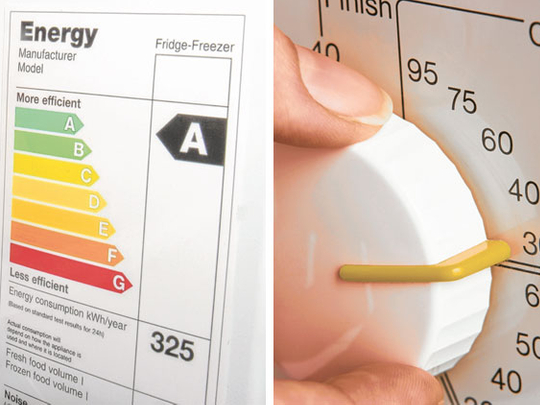
Aside from putting good consumption habits to practice, there are other cost-saving ways people can do to considerably reduce energy expenses.
The electrical appliances in your house constitute a huge percentage of your utility bill. Some of the major power guzzlers are air-conditioning, refrigerators and clothes washers. The trick, therefore, is choosing the right appliance that utilises less electricity.
Experts say that energy-efficient electrical appliances can actually cut your energy bills by as much as 80 per cent. "For example, if you were to buy a new model to replace your ancient, bulky TV that still uses CRT (Carthode Ray Tubes), you can save more than 50 per cent on electricity," says Cris Fernandez, an electrical engineer in Dubai.
Using energy-efficient products doesn't just mean saving money on utility bills. "They reduce equipment downtime, operations and maintenance requirements and also prevent pollution as well as greenhouse gas emissions.
Moreover, (they) have a higher market value than less eco-friendly facilities," notes Mashood Rahman, regional product business manager at Johnson Controls. However, the market is so swamped with numerous models claiming to be "energy-efficient" that shopping for the best appliance can be challenging.
New appliances
So, if you need to furnish your new home, or if your appliances have seen better days, here are a few guidelines to help you make an informed decision.
Go for the latest models. Every year, manufacturers upgrade their products, so any washing machine, TV, or refrigerator released recently will likely consume less electricity. So, you think your LCD television is better? Fernandez doesn't think so, saying there is actually a newer version that uses LED (light-emitting diode) technology that is more energy efficient. Therefore, it pays to do some research before opening your wallet.
"LED television sets are relatively new and can be more expensive than LCD TVs, but it churns lesser power. Unknown to many people, manufacturing costs of LED TVs are actually low, but since they're not as popular as LCDs yet, the retail price can be a pain at the moment. Ultimately, prices should drop," Fernandez says.
Check the EnergyGuide label. Manufacturers have the responsibility to inform the consumer about how much electricity an appliance uses and how efficient their products are. This information is determined by standard test procedures developed by the US Department of Energy.
"Test results are printed on yellow EnergyGuide label, which manufacturers are required to display on many appliances.
This label estimates how much energy the appliance uses, compares energy use of similar products and lists approximate annual operating costs. Your exact costs will depend on local utility rates and the type and source of your energy," Rahman says. Look for a logo called "Energy Star".
This label, which is an international standard for energy efficient appliances that started in the United States, can be found on any appliance that uses about 15 to 35 per cent less energy and exceeds the criteria for exemplary performance. Most EnergyGuide labels specify whether the product is Energy Star qualified.
"The Energy Star label serves as a seal of approval on more than three dozen products including refrigerators, air conditioners, entertainment system, cordless phones and fax machines. It also means quality, durability and long life," explains Rahman.
Stick to what you need. Size is another thing to keep in mind when buying a new appliance. Anyone living alone, for instance, does not need a giant refrigerator, and neither does a big room require an air conditioning with very low horsepower.
"If you have an unnecessarily big fridge at home and you only use a third of the space, chances are, you are wasting a lot of electricity. If your room is big and you go for the cheapest AC with the lowest horsepower, it will break easily and you will need to buy again," says Fernandez.
Thermostat function
Check the thermostat. Ever wonder why some water coolers guzzle so much electricity while others don't? Chances are some of them have poor thermostats. Thermostats are often present in appliances that have heating and cooling functions such as refrigerators, air conditioning, and water coolers and heaters.
"If the appliance has a good thermostat, it will automatically cut off power supply once the desired or ideal temperature is reached. If it doesn't, it will keep churning electricity for as long as it is plugged," says Fernandez.
"Bear in mind that there are cheap appliances, such as water coolers, that don't even have a thermostat. So, it pays to do some background research."








